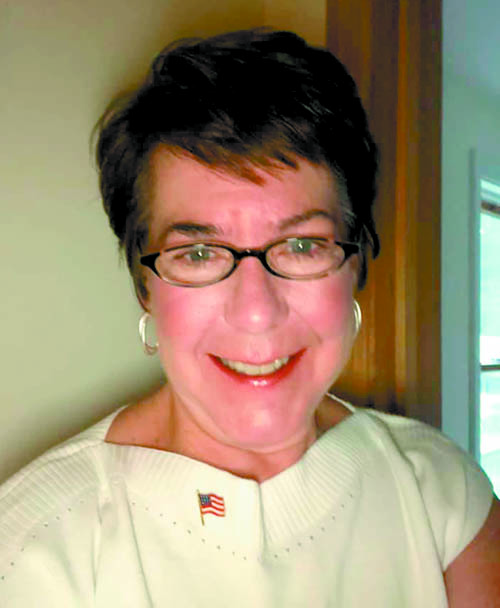On the Ballot: SD 26, Diamond vs. Lockwood

Political Party: Democrat
Family: Wife, Jane, two adult daughters, eight grandchildren Education: Bachelor of Science (BS) Education; Master’s Degree (MS) Education Administration Occupation: Business owner, State Senator
Organizations: Founding Board Member, Hospice of Southern Maine Board of Directors/Treasurer, Maine State Society for the Protection of Animals Co-Founder and President, Windham Neighbors Helping Neighbors (501c3) Founding Board Member and President, (formerly) Windham Land Trust Emergency Medical Technician, (former) Windham Fire Department Sponsor, Girls Little League Softball teams – 33 years
Honors: American Legion “Legislator of the Year” Author, Bestselling Book List - PPH, “The Evil and the Innocent” Business Person of the Year – Windham Chamber of Commerce Maine Secretary of State – 8 years Website: Diamond for Senate
The Senate District 26 race features incumbent William Diamond (D-Windham) against challenger Karen Lockwood (R-Raymond). SD 26 includes Baldwin, Casco, Standish, Raymond and Windham.
The News posed the following questions to the candidates; and their responses are arranged in alphabetical order:
Q. 1 — What qualities, skills and experiences do you possess that make you the best candidate for the job?
Diamond: While serving in the Maine Senate, I have established a record of working with both Republicans and Democrats in solving problems. Listening and working with each other as legislators based on trust, regardless of political party, is something I take pride in as a senator. Also, having served as the Senate Chairman of the State Budget Writing Committee, I understand the tough decisions that must be made to balance the state budget each year. During my time as chairman, we passed five unanimous state budgets – a very rare legislative accomplishment.
Lockwood: In June of 2020, I retired from Bath Iron Works Corp. after nearly 40 years of service. I have experienced the American dream of starting out as a shipfitter and learning how to tack weld in 1978 when there were very few women in the manufacturing division, to retiring as the executive assistant to the vice-president of Supply Chain Management and Quality. I have experience working with all levels of employees in the company. I have common sense and bring a collaborative spirit to work on solutions.
I was laid off from my job as an engineering project manager in 2010 and used the opportunity to go to college at Southern Maine Community College and earn two Associate Degrees concurrently in Hospitality Management and Culinary Arts. After college, I returned to BIW in February of 2014. I had a great experience at SMCC, and I believe that more can be done to support technical education and the Community College system. The people of Maine need an alternative option to the expensive four-year college plan.

Political Party: Republican
Family: Married, four grown children Education: Southern Maine Community College, AAS Hospitality Management, 2013 Southern Maine Community College, AAS Culinary Arts, 2013 Occupation: Retired June 2020 from Bath Iron Works Corp.
Organizations: Raymond Budget Finance Committee
Website: Facebook page, Karen Lockwood for Maine Senate
I serve on the Raymond Budget Finance Committee and look for ways to save money for my community.
Q. 2 — As Maine continues to contend with and bounce back from the Covid-19 pandemic, what three area should state government focus on and what possible solutions would you propose?
Diamond: First, we need to focus on writing a balanced budget for this year and for the next two years. This will require making very difficult decisions regarding necessary cuts to our existing budget. We cannot simply raise taxes – we will have to be ready to make serious cuts to our current level of spending.
Second, we must do everything possible to get our businesses back open on a full-time basis, allowing employees to go back to work. Our economy depends on our small businesses being able to be open and working.
Third, we must pass laws to protect our children from sexual and physical abuse, especially children under state care, which includes supporting our foster care program.
Lockwood: While it is important to balance health concerns with the economy, the pace of reopening has been too slow and restrictive causing job losses and businesses to permanently close. Many people have been harmed by these restrictions and the impacts will be felt for years.
In 2011, Governor Paul Lepage inherited a budget with deep gaps and unpaid bills to hospitals. Working together with the legislature, his administration focused on fiscal responsibility and improving the economy of Maine. The currently estimated $1.4 billion budget shortfall is a symptom of a much deeper problem of people having lost their jobs, businesses closing and mental health concerns.
I am in favor of budget cuts and holding the line on tax increases. The people of Maine cannot afford tax increases. The legislature has not been included in the decision-making process, and communication about the rules has been last minute and confusing. Maine is largely a rural state and the rural areas should have had fewer imposing restrictions than the more populous urban areas. The guidelines should have been set up so that a business could determine if it could provide goods and services in a safe manner, not having the rules set based on the type of goods and services a business provides.
Q. 3 — Where do you stand on the proposed Central Maine Power proposed transmission corridor, good or bad deal and why?
Diamond: I think the people of Maine should be able to have a say on whether or not this corridor should proceed. Also, the legislature has not had the opportunity to weigh in on this question. The legislative process would enable more in-depth investigation and facts to be revealed about the proposal. I’m still learning more about the proposed corridor nearly every day. Therefore, until the people get an opportunity to vote on this and the legislature is able to do its due diligence then I can’t support it.
Lockwood: I am in favor of the CMP Corridor. The power will flow over an existing route except for the approximately 60-mile section from the Wyman Station to the Canadian border. The corridor is permitted at 150 feet of cleared land and a 150-foot easement for future use (not cleared). CMP has agreed to allow trees and brush to grow to a certain height to protect deer habitat. The cost of upgrading the infrastructure and replacing the transmission lines will be passed on to the customers south of Maine. Maine will receive 6% of the power at a reduced rate for 20 years.
I have environmental concerns for the power generating alternatives that are being proposed, such as solar farms and wind turbine platforms on the coast of Maine. Lithium is a component in batteries and is a precious metal that is mined with environmental impacts. What is Maine’s plan for the waste disposal of lithium and solar panels when the life span is exhausted in 20 years? Wind turbines on mountain tops take away from the beauty of Maine. Will the wind platforms to be erected on the coast of Maine be floating or firm-fixed platforms? What will be the impact to the fishery and lobstering? Let alone spoiling the view along the coast.
Currently, the transmission lines do not have the capacity to carry the current load of electricity plus the power generated from solar farms and wind platforms. If those alternate power sources become the solution, CMP customers in Maine will have to pay for the upgrades to the power lines.
Q. 4 — If elected, what items/issues would be priorities and what might be ways to address them?
Diamond: I will work to reform our child protection system so that we don’t have any more children, who while in state care, are being beaten and tortured and murdered which is what happened to Marissa Kennedy in 2018 and Kendall Chick in 2017 and unfortunately to many more innocent children over the past several years.
Lockwood: Education, jobs and improving broadband capacity are the cornerstones for prosperity for individuals and businesses in our state going forward.
Q. 5 — What are the three biggest challenges Maine faces in the next three years…
Diamond: Balancing this year’s budget and the budget for the next two years. This will be difficult because cutting our existing spending levels will probably be required. We can’t address the budget deficit with a mindset of raising taxes to solve our problems.
Getting our economy back on track by supporting our small businesses and their employees. Also, supporting the education of our children at all levels will be critical to getting our economy back to full production.
We especially need to support our frontline workers, who risk their lives every day for us, including our police, fire fighters and rescue personnel and our health care professionals such as nurses and CNAs, who work in long-term care facilities, hospitals and as home care specialists.
Lockwood: Addressing the budget shortfall, increasing broadband capacity and energy solutions.
Q. 6 — …And how should state government go about addressing those challenges?
Diamond: Balancing the budget will take dedicated legislators willing to work long hours and work together with a common goal of producing a common-sense basic budget without relying on increasing taxes.
Our economy will return if we can provide support to safely allow businesses to fully open their establishments including retail and food services.
Reforming our child protection system will require the willingness to change how we currently operate the program. Changing the bureaucracy is never easy, but if we’re persistent to insist on more accountability of those who currently administer the program – then we’ll build a better protection system for our children.
Lockwood: All of these challenges are complex issues and require in-depth research and collaboration.

